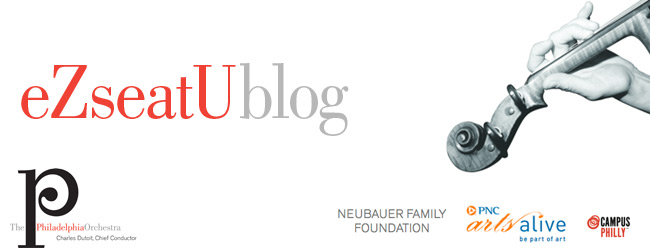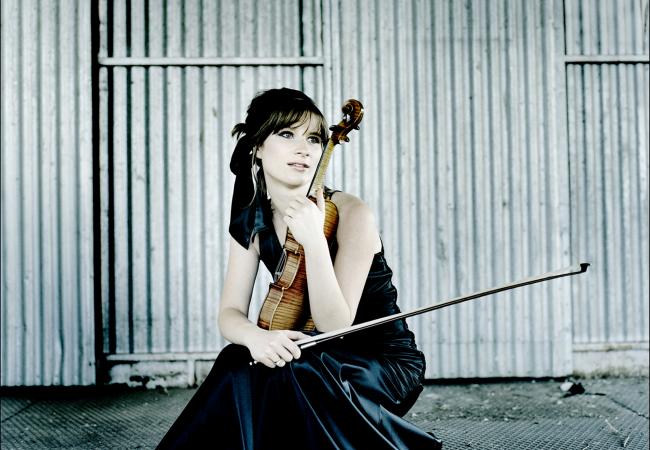You might be in the midst of midterms and papers now, but The Philadelphia Orchestra is offering some really exciting concerts this month!
Except for the last concerts, which will be led by Chief Conductor Charles Dutoit, the performances this month will be led by some of the most exciting conductors around—recently appointed Metropolitan Opera Principal Guest Conductor Fabio Luisi, San Francisco Symphony Music Director Michael Tilson Thomas, and London Philharmonic Principal Conductor Vladimir Jurowski.
These three programs also all feature works by Beethoven, so I highly suggest attending all of these concerts, whether you have been listening to classical music your entire life, or are just now getting into the symphonic repertoire.
· · Grimaud Plays Beethoven: February 3 and 5, 2011
First up, Fabio Luisi opens his Philadelphia Orchestra debut with Carl Maria von Weber’s Overture to his opera Der Freischutz, one of his most popular works.
French pianist Hélène Grimaud, who is otherwise known for her wolf-conservation efforts, performs Beethoven’s serene Piano Concerto No. 4. Focus especially on the second movement, characterized as depicting Orpheus’s calming the Furies at the entrance to the underworld so he can enter to retrieve his wife, Eurydice.
· Tilson Thomas Returns: February 10-12, 2011
1Up next is one of the concerts I am most looking forward to this season.
The engaging Michael Tilson Thomas (MTT) not only directs the San Francisco Symphony and New World Symphony in Miami
The program opens with Schubert’s “Unfinished” Symphony, called such because it contains only two movements. A highlight is the lovely, sweet, lyrical melody of the first movement, offering contrast to the dark and troubling second movement.
Following the Schubert, MTT leads the Philadelphia Orchestra premiere of a Suite from Leonard Bernstein’s opera, A Quiet Place.
The program closes with another Beethoven piece, his Seventh Symphony. Attend this concert if you want to find out why this Symphony has been called the “Apotheosis of Dance.” A highlight is the popular, haunting second movement, which begins with an ostinato in the lower strings, and gradually develops as more instruments join in.
· · Jurowski Conducts Prokofiev: February 18-20, 2011
The following week, the vibrant and young conductor Vladimir Jurowski leads a more versatile program.
The concert begins with the Prelude to Wagner’s last opera, Parsifal, whose plot is loosely based on the medieval tales of the quest for the Holy Grail. In his operas, Wagner used Leitmotifs, themes associated with characters and concepts that recur throughout the work. In this Prelude, three leitmotifs appear, representing the Eucharist, the Holy Grail, and Faith.
Lisa Batiashvili, the young, Georgian violinist, will perform Beethoven’s Violin Concerto next. One of the most challenging pieces for the violin, this work is considered the first of the great Romantic violin concertos, eventually followed by the Mendelssohn, Bruch, Tchaikovsky, and Brahms violin concertos, among others.
The program ends with Prokofiev’s Sixth Symphony, a work written as an elegy to the horrors of World War II. The work was later condemned by the Stalinist regime.
· · Tchaikovsky and MacMillan
Lastly, we have a program this month conducted by our own Charles Dutoit, and without a Beethoven piece (although I’m definitely not complaining about all of the Beethoven!).
Up first, a work by Dutoit’s favorite composer. Berlioz’s Overture to his Shakespeare-influenced comic opera Beatrice and Benedict. This brilliantly orchestrated piece draws upon a variety of melodies from the opera.
Next, the U.S.
The program ends with a piece beloved by everyone, Tchaikovsky’s Fifth Symphony. Listen to the way the composer connects the four movements of this work with the “Fate” motto, first used in the introduction of the first movement, then intruding in the operatic second movement, closing the ballet-like third movement, and finally used in a heroic and victorious way in the last movement.
--Amalya Lehmann




